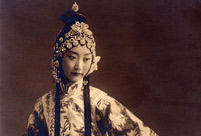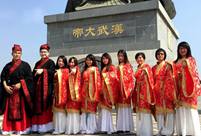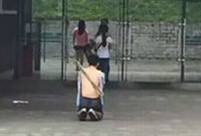

TOKYO, July 6 -- "Should Japan learn a lesson from its past history or try to dodge it?" was the core question raised by Japanese historical scholar Akira Yamada in his book 'How Japan should face up to history.'
"However, regrettably, not only has Abe's administration not improved in its historical recognition issue, it grows more dogged and has regressed in the last two years, which will cost the country greatly in the future," Yamada said in an exclusive interview with Xinhua.
ABE'S PERSONAL WAR ANNIVERSARY STATEMENT UNACCEPTABLE
Japanese Prime Minister Shinzo Abe hinted recently that he may release a landmark statement which marks the 70th anniversary of the end of the WWII in the format of his personal opinion, instead of seeking Cabinet approval.
Regarding this, Yamada, also a professor of modern Japanese history at Meiji University, said Sunday that this kind of explanation is unacceptable to the international community.
"As the representative of the government, no matter how Abe tries to personalize this statement, it still will be seen as reflecting the entire government's view," Yamada said.
Former Prime Minister Tomiichi Murayama issued a statement on the 50th anniversary of Japan's surrender in WWII, in which he expressed his "deep remorse" and offered a "heartfelt apology" to the countries which had suffered from Japan's aggression and colonial rule.
"All successive cabinets uphold that statement. If Abe falls short of offering an apology over Japan's wartime aggression, he in fact is denying the consistent stance of previous administrations on this issue."
"It marks a major change for the world and will not gain understanding from Japan's neighboring countries even in the name of his 'personal view'," Yamada stated.
ABE TRIES TO "REFORM WITH OWN VALUES"
A series of offensive moves adopted by Abe since he took office again, including changing the constitution's interpretation and security legislation, are all closely bound up to his personal beliefs and values. "The prime minister is trying to reform the country by his own will, reviving militarism like in the pre-war era," Yamada said.
Yamada believed that Abe's historical revisionism and ambition to revise Japan's war-renouncing pacifist constitution are the main reasons that sour Japan and its neighboring countries' relations.
Abe is not active in trying to repair relations with them, on the contrary, he "worsens on purpose Japan and its neighboring countries' relations to make Japanese people feel a sense of crisis, so that they will recognize the necessity to strengthen the country's military power."
"History shows us that building good relations with neighboring countries is of great importance. However, Abe uses historical problems as well as territorial issues to realize his short-term goal, it is obviously wrong."
"At a time when the world is celebrating the 70th anniversary of the WWII, it is more important for Japanese people to rethink whether the direction Abe is leading Japan in is right or wrong."
HISTORICAL EDUCATION NECESSARY FOR YOUNGER GENERATIONS
Recent surveys have showed that some Japanese, especially young people believe Japan has already asked enough for forgiveness or need not apologize at all. Talking about that problem, Yamada pointed out that it is a travesty for younger generations.
Most Japanese people barely learn any 20th century history, especially how Japan invaded its neighboring countries, Yamada said. "On one side, memories of the war in Japanese society are gradually fading, on the other hand, victim countries cannot forget their suffering. Thus, the gap between the two sides will only get wider and wider."
To this end, Japanese Crown Prince Naruhito has said: "It is important to look back on the past humbly and correctly pass down tragic experiences and the history behind Japan to the generations who have no direct knowledge of the war, at a time memories of the war are about to fade."
Yamada greatly agreed with that view. He believed that historical education is responsible for a number of Japan's foreign relations difficulties and it is time to change that situation.
"The longer Japan puts off the issue, the more costly it is," the 58-year-old historian suggested.
 Evolution of Chinese beauties in a century
Evolution of Chinese beauties in a century Creative graduation caps of ‘vigorous elves’
Creative graduation caps of ‘vigorous elves’ Typhoon class strategic Submarine in photos
Typhoon class strategic Submarine in photos Hong Kong college students feel the charm of Hanfu
Hong Kong college students feel the charm of Hanfu Japan’s crimes committed against "comfort women"
Japan’s crimes committed against "comfort women" Odd news:“carrying a rod and asking to be spanked”
Odd news:“carrying a rod and asking to be spanked” Legendary life of a bee-keeping master in Hainan
Legendary life of a bee-keeping master in Hainan 4-year-old cute 'monk' spends summer holiday in temple
4-year-old cute 'monk' spends summer holiday in temple Hong Kong in lens
Hong Kong in lens Editorial: An uncertain road ahead for Greece and EU
Editorial: An uncertain road ahead for Greece and EU China’s class of 2015 gets creative with graduation photos
China’s class of 2015 gets creative with graduation photos Girl power on the pitch
Girl power on the pitch Giant panda Yuanzai turns two at Taipei Zoo
Giant panda Yuanzai turns two at Taipei ZooDay|Week